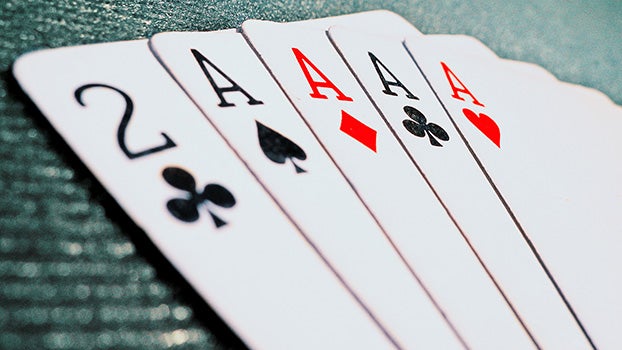Taking the gamble: Part 2
Published 8:21 am Friday, July 20, 2018
In a previous closer look, gambling was reviewed — particularly millionaire parties, which are events regulated by the Michigan Gaming and Control Board where a charity is allowed to host games commonly played at casinos. This series will look at the possible negative impacts of gambling and how future legislation may impact gambling in southwest Michigan.
Millionaire parties throughout Michigan netted an overall profit of $7 million in 2017. This was the result of more than $78 million in chip sales and 8,417 separate millionaire party days.
According to May Kay Bean with the Michigan Gaming Control Board, there is only one millionaire party in the area.
“Currently, Joey Armadillo’s is the only approved location [for millionaire parties] in Berrien or Cass counties,” Bean said in an email. “It has been a location since before our agency began regulating millionaire parties in April 2012. That is when Gov. Rick Snyder signed an executive order transferring licensing and regulation of millionaire parties to our agency from the Michigan Lottery Charitable Gaming Division.”
After MGCB was given the regulatory power over millionaire parties several were shut down across the state due to crime and corruption.
Negatives associated with gambling
As noted, local gaming provides a significant amount of money to the community, but, at the same time, millionaire parties have not been perfect.
Charitable gaming has been legal since of the Traxler-McCauley-Law-Bowman Bingo Act was passed in 1972, but millionaire parties did not take off until 2004, after Texas Hold ‘Em was authorized for play. That year, chip sales were $7.9 million. By 2011, chip sales ballooned to $197 million.
But that much success came with crime and corruption. From 2010 to 2015, 24 millionaire party locations were forced to close, many of them by the MGCB.
“You got to respect those guys because they can shut you down,” said Joe Todd, the charitable gaming chair at Niles High School.
These industries were shut down for violations such as illegal gambling, defrauding charities, pay-to-play schemes, changing gaming records and prostitution. The MGCM is still cracking down on millionaire parties. In April of this year, 79-year-old David Lee Thiese Sr. was sentenced to 60 month probation after defrauding a local church $36,862 in millionaire party profits. He was also ordered to pay back the money.
Todd, who helps other Niles Community Schools host millionaire parties at Joey Armadillo’s Bowling Alley, Sports Bar and Restaurant, said that he has never seen any fights or illegal gambling there.
“There’s never been a single violation at Joey’s,” he said.
He has witnessed minor infractions, but he said that they are sure to clean them up the next time an inspector comes around.
“[An inspector] came into the poker room one time and there was a 16-year-old kid just sitting there, not playing, but just watching and the inspector goes, ‘no one under 18 can be in here,’ and we were like, ‘we didn’t know that,’” Todd said. “When he came back, there were signs all over that no one 18 and under can come in the room.
“That’s the type of thing that if he tells us something, we do it. We’ve never had a problem.”
Legislative changes
While the MGCB and other gaming commissions seem to have poker and other forms of gambling under control, they could be in for a whole new challenge due to a set of bills that together are referred to as Michigan’s Lawful Internet Gaming Act, which was already passed by the Michigan House of Representatives.
If the state senate passes it, internet gaming will be allowed in Michigan for games that are already played in brick-and-mortar casinos. This could make online poker in the state legal, after several of the major online poker websites, such as PokerStars.com and FullTilt.com, were banned from operating in the United States in April 2011.
“Online poker was huge for the longest time. I used to play on PartyPoker.com,” Todd said. “I used to do quite well there. I was making about $600 to $1,000 per month. I was really good at online poker than then poof, it was shut down.”
Rep. Brandt Iden, who sponsored two of the bills in the Lawful Internet Gaming Act, told SportsHandle.com that if this act passes it “sets the framework” for sports betting as well. This can happen due to the Supreme Court recently striking down a 1992 federal law in May that prevented commercial sports betting in most states.
It will then be up to state casinos to purchase licensing that allows them to run online gambling and sports betting in the state. This includes the three casinos in the Detroit area and the tribal casinos throughout the state. The casinos in Detroit are regulated by the MGCB.
“We are reviewing the proposed legislation,” Bean said. “We will be ready to regulate licensed internet gaming and sports betting if and when the legislation becomes law.”
The Four Winds Casino is also preparing for the proposed legislation.
“Four Winds Casino is aware of the Supreme Court ruling regarding sports betting,” said a Four Winds representative in a statement. “If the states of Indiana and/or Michigan allow sports betting, we would look at opportunities to enhance our guests’ gaming options.”
The state Senate is expected to vote on the set of bills when it reconvens in September.
“An internet gaming licensee would be subject to a 10 percent tax on the gross gaming revenue from internet gaming conducted under the Act,” Bean said. “The tax must be paid on a monthly basis, due on the 10th day of the following month.”
She says that 55 percent of this tax would go to the city where the internet gaming licensee’s casino is located. The other 45 percent will be deposited into the state’s Internet Gaming Fund.
While legal online poker seems like it could be a threat to millionaire parties, Todd said that he is not worried about it impacting the poker room at Joey Armadillo’s.
“I think a lot of our players love being around people,” he said. “There’s a small percent that would rather sit in front of the computer and play. And tell you what, you can do that now. Even though your money is not guaranteed, you can still play online [on websites based overseas]. [Authorities are] not going to come and arrest you for those, but you might not get your money back.”
In an upcoming edition, Part III will discuss other forms of charitable gaming regulations in Michigan.







